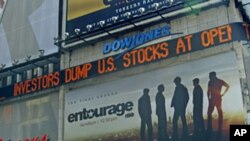Reactions in New York City to Monday's stock market plunge were mixed. In the wake of America's credit downgrading by a key financial ratings agency, our reporter went to New York's Times Square to see what people had to say.
Underneath electronic news banners announcing the stock market plummet, the atmosphere seemed highly charged.
Jesse Epstein of New York City said the world is jittery over the political wrangling between the U.S. Congress and President Barack Obama over how to bring the national debt under control.
“The problem was we didn’t act decisively with respect to the debt ceiling," said Epstein. "We wishy-washed around [vacillated] and it gave out a bad impression. I’m concerned, but I’m trying not to be. Ultimately, everything will go back up.”
But Leesh Mikkanen, who is visiting from Toronto, Canada, was more concerned.
“It’s actually quite frightening," said Mikkanen. "I know it's affecting the world's economy. Because we are all so interconnected, the American economy is having an effect all over the world.”
Alex Cogdell, also from Canada, says America's debt crisis is the most ominous development in a series of financial crises in the United States and Europe that could drag down the world economy.
“I am really concerned about what is going to happen in the future," said Cogdell. "I am scared about feeding my family, myself. I am concerned for our welfare of humanity as a race. Obviously, we need to find a way to make things start working.”
When passersby were asked to name the source of America’s current economic problems, some faulted the U.S. government's massive borrowing. Others pointed to what they say is political partisanship in Washington.
This Colorado woman said the two are related.
“I think our politics is a systemic problem, so I think that is what is foundationally wrong with why the economy drops and why the people that suffer the most from it are the people with the least amount of say in how the economy goes," she said. "And the people who are in control of it, they are going to continue to do what they want to do.”
Given the volatility in the financial markets as well as investor worries and a sense that the government has little control over events, such public unease might continue for some time.
New York Wary as Stock Markets Fall




